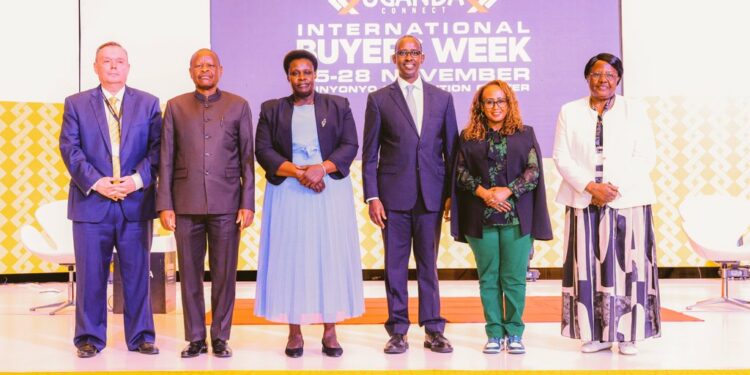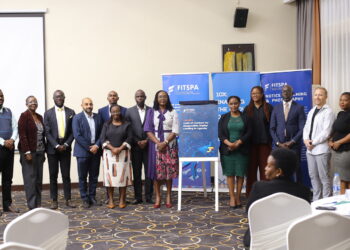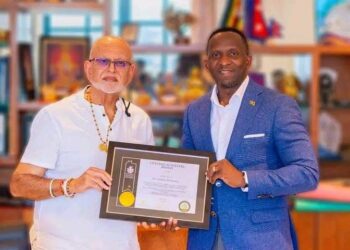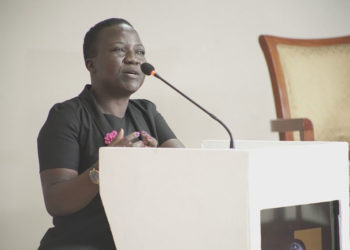President Yoweri Kaguta Museveni has called on international investors and buyers to seize the vast economic opportunities Uganda presents, emphasizing value addition, industrialization, and strong trade partnerships as the anchors for the country’s future growth.
The President’s message, delivered by Vice President Jessica Alupo on Day 2 of the Uganda Connect International Buyers Week 2025 at the Munyonyo Convention Centre, set an ambitious tone for the country’s export and investment agenda.
Museveni: “Turn interest into actual orders and orders into enduring partnerships.” Welcoming hundreds of trade delegations from across the globe, President Museveni said the Buyers Week was not merely an exhibition—but a strategic platform to deepen Uganda’s integration into global value chains.
“The main focus of this week is to consolidate efforts aimed at turning interest into actual orders and orders into enduring partnerships that can result in jobs and incomes for our people,” the President said.
He highlighted Uganda’s competitive advantages, including a young, educated population, year-round agricultural potential, improved infrastructure, and strong political stability.
But he stressed the need for more capital, entrepreneurship, and knowledge to unlock the country’s full economic promise. “Uganda has always had an abundant supply of labour and land. However, we have been short on capital, entrepreneurship, and knowledge. Without these, our resources will stay as they have been since the time of Jesus,” the President remarked.
President Museveni once again reaffirmed the NRM government’s target of propelling Uganda’s GDP from the current USD 61 billion to USD 500 billion “in the shortest possible time,” hinged on peace, a private sector–friendly climate, and export-led growth.
He praised the rise of key export sectors—coffee, dairy, gold, and horticulture—revealing that Uganda earned USD 5.23 billion in exports in the first half of 2025 alone.
Coffee, he said, continues to “show strong earnings,” while dairy output reached 5.4 billion litres by the end of 2024, with new markets emerging in Nigeria and Algeria.
He further emphasized the shift to value addition, “The NRM government has stopped the export of raw materials. We have invested in industrial hubs for processing. I invite international partners to invest in processing plants, cold chain systems, packaging facilities, and other export infrastructure.”
He also announced strengthened sanitary and phytosanitary systems and the upcoming Entebbe Free Zone Centre of Excellence, which will streamline export processes using AI, digital inspections, and shared facilities.
Earlier, Presidential Advisor and Chairman of the Presidential Advisory Committee on Exports and Industrial Development (PACEID), Odrek Rwabwogo, delivered a spirited address calling for a mindset shift toward high-value manufacturing.
He noted that while Uganda’s food export boom is impressive, it is “only a temporary advantage.”
“We must aim at manufacturing higher-value goods. Our next frontier is electricals, pharmaceuticals, and eventually—who knows?—aviation and semiconductors,” Rwabwogo said. “This should not be a preserve of the developed world. We have all the raw materials to make these things. It’s just confidence and consistency.”
He described ongoing government efforts to transform rural talent into industrial capacity through training programmes that give young innovators practical qualifications.
Rwabwogo highlighted the government’s USD 400 million injection into 3.6 million households through the Parish Development Model, calling it “a very significant step.”
“For the first time in our history, the common person has a direct payment from the national budget. If you never held USD 10, now you have USD 320—what can you do with chicken, sesame, or pineapples? This will trigger massive agricultural production.”
To support this expansion, he said Uganda urgently needs investments in refrigeration, transport, drying, and storage, noting that current refrigeration capacity covers only 30% of national needs. He also revealed plans for aggregation parks—industrial spaces designed to ensure quick fulfillment of export orders and reliable supply.
He announced that the government would set up trade houses to ease market entry for exporters, while also tightening food-safety oversight to counter non-tariff barriers.
With several deals expected to be signed during the week, Rwabwogo projected that Uganda could close the year 2025 with at least USD 1 billion in new business from engagements made at the Buyers Week.
Meanwhile, President Museveni urged international buyers to trust Ugandan suppliers—and encouraged local exporters to meet global packaging and quality standards.
“Uganda is open,” he declared. Let us build partnerships that expand trade, create jobs, and strengthen prosperity for all.”
The Uganda Connect International Buyers Week continues through the week, bringing together global buyers, investors, Ugandan exporters, government agencies, and innovators seeking to shape the country’s next phase of export-driven growth.
Do you have a story in your community or an opinion to share with us: Email us at editorial@watchdoguganda.com













